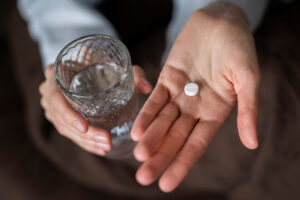Alcohol and tinnitus are frequently linked, especially by individuals who report that their ear ringing worsens after drinking.
While alcohol is commonly consumed in social and recreational settings, its effects on hearing health — particularly in relation to tinnitus — are not always fully understood.
This article explores how alcohol impacts the auditory system, who may be more susceptible to alcohol-induced tinnitus, and what strategies can help manage symptoms without eliminating alcohol completely.
Alcohol and Tinnitus: What’s the Connection?
Tinnitus is the perception of sound, such as ringing, buzzing, or hissing, in the absence of an external source.
It affects approximately 15% of the adult population in the United States and has many potential causes, including noise exposure, hearing loss, and neurological issues.
Alcohol can act as both a vasodilator and a neurotoxin, which means it can widen blood vessels and interfere with nerve function.
In the context of tinnitus, these effects may play a role in triggering or amplifying symptoms.
When blood vessels dilate, it can increase blood flow to the head and ears, potentially intensifying the perception of sound in the ear.
Alcohol also affects neurotransmitter levels in the brain, including those involved in auditory processing.
Disruptions in these pathways may heighten the perception of phantom sounds.
For individuals already experiencing tinnitus, drinking may temporarily exacerbate the condition.
Some report louder or more persistent ringing after consuming alcohol, especially in the hours following consumption.
How Alcohol Influences the Inner Ear
The inner ear — particularly the cochlea — plays a central role in hearing.
Alcohol can alter the delicate balance of fluids within the inner ear, which is crucial for both hearing and balance.
Ethanol may disrupt ion channels and cellular processes in the auditory hair cells, which can impair sound transmission.
These disruptions may lead to a temporary or, in some cases, lasting change in hearing sensitivity.
Chronic alcohol consumption has also been linked to auditory neuropathy, a condition where sound enters the ear normally but is not properly transmitted to the brain.
Furthermore, alcohol’s dehydrating effect can compound inner ear problems by thickening cochlear fluids and making the environment less stable.
This instability could make existing tinnitus more noticeable or even provoke new symptoms in vulnerable individuals.
Does Alcohol Trigger or Worsen Tinnitus?
While research is ongoing, several studies and clinical observations suggest that alcohol can worsen tinnitus symptoms, at least temporarily.
One possible explanation is the impact of alcohol on the central nervous system.
As a depressant, alcohol slows neural activity, which may alter the brain’s ability to filter out internal noise.
This reduction in inhibitory control may make tinnitus seem louder or more intrusive.
Additionally, alcohol can interfere with sleep, which is closely linked to tinnitus severity.
Poor sleep often exacerbates tinnitus, creating a cycle of heightened perception and increased stress.
Some individuals also experience spikes in blood pressure or heart rate after drinking, which can be accompanied by a sensation of pulsatile tinnitus — a rhythmic sound in sync with the heartbeat.
While occasional drinking might have minimal impact for some, others find that even small amounts can aggravate their symptoms.
Keeping a symptom diary may help identify personal triggers and patterns.
Who Is More Susceptible to Alcohol-Related Tinnitus?
Not everyone who drinks will notice a change in their tinnitus, but certain groups may be more vulnerable.
People with preexisting hearing conditions, such as sensorineural hearing loss, may be more sensitive to alcohol’s effects.
Older adults often have reduced auditory resilience, making them more likely to experience tinnitus after drinking.
Those taking medications that affect the central nervous system — such as antidepressants, sedatives, or certain painkillers — may also be at greater risk.
Alcohol can interact with these drugs and amplify side effects, including tinnitus.
Genetic factors may influence susceptibility, as some people metabolize alcohol in ways that affect vascular and neurological function more dramatically.
Individuals with high levels of stress or anxiety may find that alcohol initially offers relief but later worsens tinnitus once the calming effect wears off.
This rebound phenomenon can create a confusing cycle of short-term comfort followed by heightened symptoms.
Understanding your own body and health history is key to identifying risk factors.
Managing Tinnitus Without Giving Up Alcohol Completely
If you enjoy drinking but are concerned about its effects on your tinnitus, moderation is critical.
Limiting intake to one or two drinks on social occasions may reduce the risk of symptom flare-ups.
Choosing beverages with lower alcohol content, such as beer or wine instead of spirits, may also help.
Spacing drinks with water and staying hydrated supports inner ear function and reduces dehydration-related complications.
Avoid drinking on an empty stomach, as this accelerates alcohol absorption and may intensify its effects.
Opt for quieter social environments, as background noise can amplify tinnitus perception, especially after drinking.
Plan your drinking earlier in the evening to minimize sleep disruption and give your body time to metabolize the alcohol.
Keeping a journal that tracks your tinnitus severity in relation to drinking habits can help you identify thresholds that work for you.
When managed wisely, occasional alcohol consumption doesn’t have to conflict with tinnitus care.
Natural Support for Tinnitus Relief
For those seeking additional ways to support ear health, natural supplements may provide relief.
Sonus Complete is a plant-based formula designed to reduce the intensity of tinnitus and support auditory system function.
Its ingredients — including vitamin B12, niacin, garlic, hawthorn berry, hibiscus, and olive leaf — have been selected for their anti-inflammatory, antioxidant, and neuroprotective properties.
By improving blood flow and reducing nerve irritation, Sonus Complete may help minimize tinnitus symptoms, particularly for those who experience flare-ups after alcohol consumption.
It is free of artificial stimulants and safe for long-term use, making it a convenient option for individuals seeking non-pharmaceutical support.
Some users report improvements in focus, sleep, and stress management — all important factors in controlling tinnitus severity.
When paired with smart lifestyle choices, a natural supplement like Sonus Complete can be a valuable part of your tinnitus care strategy.
Take Back Control of Your Hearing Health
While alcohol and tinnitus can be a frustrating combination, understanding their relationship empowers you to make informed choices.
For those who want to enjoy social drinking without sacrificing ear health, moderation and awareness are key.
Sonus Complete offers natural support to help balance your auditory system and reduce the discomfort of tinnitus.
To learn more about how Sonus Complete can support your hearing health, visit the official website and take the first step toward relief.









